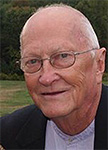FAST FOOD FOR THOUGHT — poetry by Eldon Katter (Ethiopia)
FAST FOOD FOR THOUGHT: Poetry to Ponder
by Eldon Katter (Ethiopia I, 1962-64)
About My Book

Eldon Katter
First let me say that this soft cover book of poetry, Fast Food for Thought, has nothing to do with food. The title is meant to suggest that the poems are short, easy to read, and worth mulling over. The poems touch upon a wide range of subjects from identity, choice and change to aging and the environment.
I have grouped seventy poems, some written during the Covid pandemic, into six thematic sections with “menu headings” to serve as guides for thinking about some very basic human behaviors: Adapting, Relating, Reflecting, Engaging, Caring, and Opining.
Throughout the book, on every other page, I have included an “amuse bouche” — a “small bite to delight” or “something to chew on,” before the titled poem on the opposite page. In all, this little book is a collection of poetry to ponder.
About Writing the Book
For many people, the “stay-at-home” restrictions during the initial rise of the Covid19 pandemic in the spring and summer of 2020 were an almost unbearable hardship. Not so for me. Although seemingly endless, I found the long periods of confinement to our home a comforting time for reflecting on the past, while at the same time cleaning, sorting and discarding decades of ephemera in hopes of simplifying my life.
As I sorted through handwritten pages from the past, the notion of organizing a collection of my poems, old and new, began to take shape. Because most of my journaling is on impulse and spur of the moment ideas, the body of my writing lacks a consistent voice or cohesive purpose. So I was challenged to come up with themes around which I could organize the diversity of thoughts expressed in my poetry. I finally settled on “menu headings” under which I could list the wide assortment of “food for thought.”
The phrase “it’s just food for thought” was my mother’s way of reminding me that her advice was worthy of consideration and her opinions deserved to be given serious thought. I now, in turn, have adopted this phrase as an invitation for readers to stop and ponder each poem after a first, perhaps fast, read.
I don’t know why my mother adopted this phrase as a parenting method in the 1930s, but the expression supposedly dates from the late 1800s. However, at least three centuries earlier, the idea that digestion in the stomach was akin to mulling something over in the mind was expressed in similar ways. The phrase “something to chew on,” implying to think about something carefully for a long time before making a decision about it, is a familiar example.
About Me, the Author
Throughout the last half of the 20th century, my sense of who I was and where I belonged was associated with teaching. I identified myself as “teacher” and planned the events in my life around starting a new school year every September. When asked “what do you teach?” my response was always, “Kids.”
During those 20th century years, there were times when I side-hustled as a janitor, men’s ware salesman, department store window decorator, and much more. The side-hustles were a means of survival and supporting a family on a teacher’s salary. But “teacher” defined my image of self and “school” defined the place where I belonged.
Higher education and multiculturalism became my focus in the 1970s, ’80s and ’90s — first as a professor and eventually as chair of the Department of Art Education and Crafts at Kutztown University in Pennsylvania. During those three decades, I co-created several art games, designed numerous instructional resources, and co-authored an elementary and middle school art textbook series, all with a multicultural emphasis. Toward the end of the century, I was the editor of SchoolArts Magazine and president of the National Art Education Association.
Looking back, one decade holds the most satisfying and lasting memories. In the 1960s I joined the Peace Corps and taught at a teacher training school in Harar, Ethiopia. That’s where I met my wife, Adrienne, also a Peace Corps Volunteer. After we were married, we worked for the Teacher Education in East Africa Project in Kampala, Uganda. I suppose that is how I came to be interested in making distinctions among universal, cultural, and individual experiences as a direction for art education in a multicultural society. So when asked “what has been your greatest accomplishment?” my response is “I was a Peace Corps Volunteer.”
Now, in the 21st century, I’m a retired octogenarian. I continue to be a husband, father of three, grandfather of five, an advocate for art education, an occasional papermaker, and an obsessive compulsive self-declared poet.
 Fast Food for Thought: Poetry to Ponder
Fast Food for Thought: Poetry to Ponder
Eldon Katter (Ethiopia 1962-64)
A Peace Corps Writers Book, 2020
178 pages
$5.99 (paperback)
Eldon, You brought joy and tears to my eyes as I read your pithy comments. Can’t wait to read
your published effort. From the heights of Harrar to the lesser ones of Dire Dawa I salute you
and Adrienne. Bill